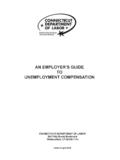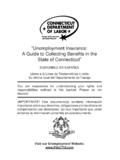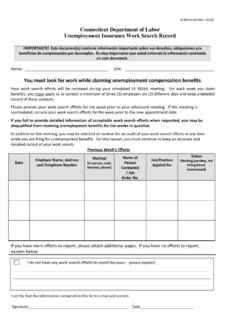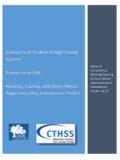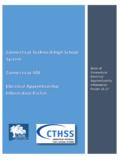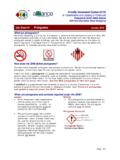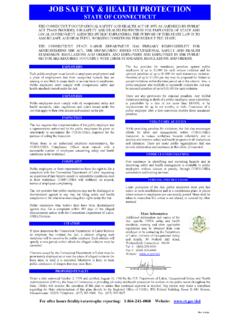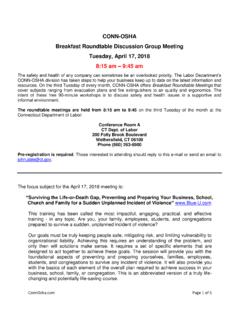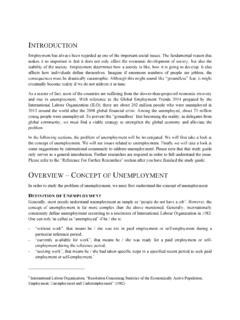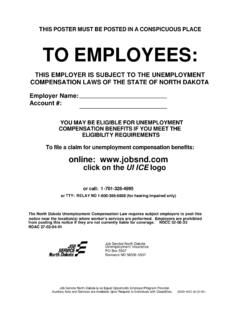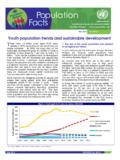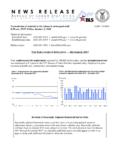Transcription of AN EMPLOYER’S GUIDE TO UNEMPLOYMENT …
1 AN EMPLOYER'S GUIDE . TO. UNEMPLOYMENT COMPENSATION. CONNECTICUT DEPARTMENT OF LABOR. 200 Folly Brook Boulevard Wethersfield, CT 06109-1114. TABLE OF CONTENTS. PAGE. Preface.. UNEMPLOYMENT Compensation Law..1 Who Is Required to Register - How to Register..1. Limited Liability Companies..2. Conditions of Liability.. 3. Federal Tax Liability.. 3. Successor.. 3. Agricultural.. 3. Domestic Employment.. 4. Non-profit Organizations..4. Municipalities, State Government Agencies, and Federally Recognized Indian Tribes or Tribal Units..5. Voluntary Acceptance.. 5. Discontinuance of Business.. 5. Employment Definition.. 5. Service Within and Without the State.. 6. Localization..6. Base of Operations.. 7. Place from Which Work Is Directed or Controlled..7. Place of Residence ..7. Multi-state Workers.. 8. Independent Contractors.. 8. Excluded Employment .. 8. Excluded Employment - Governmental and Non-profit Employers.. 10. Records to Be Maintained by Employers.
2 10. New Hires.. 11. Social Security Numbers..11. Display of Posters .. 11. Tax Liability..12. Taxable Wages ..12. Non-taxable Remuneration .. 13. Reporting of Tips Received .. 13. Reporting of Wages/Contributions ..13. Internet Filing of UI Tax and Wage Reports .. 13. Magnetic Media Wage Reporting.. 15. None Returns by Telephone or via the Internet .. 15. Paper Wage Reporting.. 15. Taxable Employer.. 15. Reimbursement Method Employer ..16. Correction of Employer Contribution Returns.. 16. Failure to File and Pay Timely.. 16. Failure to File Fee .. 16. Interest Charge and Penalty Charges for Late Payment .. 17 Taxable Employer .. 17. Reimburasable Employer .. 17. Collection of Past Due Contributions.. 17. Estimated Ability to Pay.. 18. Assessment .. 18. Special Assessment (When Applicable).. 18. Bond Assessment (When Applicable) ..19. Reimbursement Method Employers - Basis of Charging .. 19. Election to Change Payment Option.
3 19. Bonds from Foreign Contractors.. 20. Miscellaneous Information-Secretary of the State .. 20. Retroactive Wage Payments.. 20. Prohibition of Deduction from Wages .. 20..Filing Procedure If No Employees.. 21. Limitation on Determination of Liability .. 21. Employer Audits .. 21. SUTA Dumping.. 21. Penalties.. 21. Experience Rating.. 22. Contribution Rates and Eligibility Requirements for a Rate Based on Experience.. 22. Rate for Newly Liable Employer ..23. Charged Rate..23. Fund Balance Tax Rate..23. Contribution Rate Factors..23. Transfer of Experience Ratings..24. UNEMPLOYMENT Benefit Entitlement.. 24. Base Period .. 24. Benefit Year .. 24. Benefit Rate and Duration..24. Dependency Allowances..25. Requalification Requirement..25. UNEMPLOYMENT Claim Procedures and Their Effect on Employers' Experience Accounts .. 25. UNEMPLOYMENT Notice.. 25. Lack of Work Verification Form .. 26. Benefit Charging - Taxable Employer.
4 26. Non-charging Separation Provisions .. 27. Voluntary Quits .. 27. Discharges ..27. Refusals of Work..28. Refusal by a Claimant of an Offer of Rehire by the Charged Employer..28. Dismissal/Severance Payments - Allocation .. 29. Other Non-charging Provisions .. 29. Benefit Charging - Reimbursement Method Employer .. 30. Notices to Employers and Appeal Provisions .. 30. Employer Participation in UNEMPLOYMENT Compensation Fact Finding Hearings ..31. Other Forms Related to Charges .. 31. Appeals Referees and Board of Review.. 32. Glossary..34. Central Office Directory.. 36. Tele-Benefits Line..37. Directory of Field Audit Offices .. Back Cover PREFACE. This booklet is provided by the Employment Security Division to enable employers covered by Connecticut's UNEMPLOYMENT Compensation Law to better understand the UNEMPLOYMENT insurance system which they support through payroll taxes. It is intended to assist employers in becoming acquainted with their responsibilities as well as with the responsibilities of the Department under the Connecticut Law.
5 It is for information purposes only, and does not have the force of law or regulation. Many employer questions regarding Department functions and procedures are covered in the booklet, but because it is impossible to cover all circumstances, employers are urged to consult the Department for additional details. The cooperation of the employer community is vital in order to effectively administer the UNEMPLOYMENT Compensation Law and the Department's policies and procedures. The Connecticut UNEMPLOYMENT Compensation Law and Official Regulations should be consulted if there are legal questions. Copies of these are available through Business Management, UNEMPLOYMENT Compensation Department, 200 Folly Brook Boulevard, Wethersfield, CT 06109- 1114 (Telephone (860) 263-6048). When amendments to the law affect employers' rights or responsibilities, this information will be made available. Failure to be informed on provisions of the law does not relieve an employer of his responsibilities.
6 INFORMATION ON OTHER PAYROLL-RELATED MATTERS. IS AVAILABLE FROM THESE SOURCES: Federal UNEMPLOYMENT Tax Social Security Tax Federal Withholding Tax Federal Income Tax . Internal Revenue Service State Income Tax State Sales Tax State Corporation Tax ..Dept. of Revenue Services Workers' Compensation Coverage Disability Benefits Coverage ..Workers' Compensation Commission .. or the insurance carrier .http:// THE UNEMPLOYMENT COMPENSATION LAW. The Connecticut UNEMPLOYMENT Compensation Law provides workers with benefits during periods of total or partial UNEMPLOYMENT . A booklet entitled A. GUIDE to UNEMPLOYMENT Benefits in Connecticut-Your Rights and Responsibilities . explains to the unemployed worker the various steps necessary to file a claim, requirements of eligibility and how benefits are computed. Funds for the payment of UNEMPLOYMENT benefits are provided by employers through a quarterly payroll tax, or by a monthly billing reimbursement available to qualified non-profit organizations, the state, towns,cities and their political or government sub-divisions, and federally recognized Indian tribes or tribal units.
7 Liable employers are assigned a registration number. Those on the contribution (tax) method who file their tax return by mail receive a pre-addressed Employer Contribution Return by mail each quarter. Those who file electronically or via magnetic media, or who use an agent receive a contribution voucher by mail each quarter. This return, together with the correct payment, must be sent to the Administrator, UNEMPLOYMENT Compensation on or before the last day of the month following the close of the calendar quarter. The Connecticut Labor Department would prefer employers file their quarterly UNEMPLOYMENT compensation contribution returns via the internet at dol. Click on File your Tax Return Right on the Internet . All non-profit reimbursable employers are required to file a Quarterly Wage Report also on a pre-addressed form issued by this agency. The due date for this is the fifteenth day of the second month following the close of the calendar quarter.
8 Thus, the due dates are the 15th of February, May, August and November. How to Register Employer's can register their business via the internet, which we strongly encourage, or they can register by completing the appropriate forms which can be obtained by calling the Employer Status Unit at (860) 263-6550. or drawing the forms down from the Connecticut Department of Labor Website. These forms as well as others including Quarterly UNEMPLOYMENT Compensation Tax forms, Correction Returns, and Separation Packets, and this Employer's GUIDE can also be accessed at the Labor Department Website at WHO IS REQUIRED TO REGISTER. All employers of one or more persons (full or part-time) must register by filing an Employer Status Report. Failure to receive a copy of the form does not relieve the employer of the obligation to register. 1. Form Connecticut UC-1-NP is used to register qualified non-profit organizations, Form Connecticut UC-1-MUN for municipalities and other government entities, including Federally recognized Indian Tribes and Form UC-1A for all other employers.
9 A sole proprietor or a single member of an LLC operating as a sole proprietorship is not an employee nor is his or her spouse, parents or children under 21 years of age an employee. A partner in a partnership is not an employee nor is a member of an LLC-partnership an employee. Children under 21 years of age working for their mother/father partnership or for an LLC partnership comprised of their mother and father are not employees. Officers of a corporation or members of a LLC filing as a corporation who receive remuneration during the year, or whose personal accounts are credited, are counted as employees for each week of the calendar year. Sub-chapter S Corporations differ from other Connecticut corporations in that they can elect not to be subject to a federal corporation income tax. They are subject to the Connecticut UNEMPLOYMENT Compensation Law, as are other corporations. An officer(s) of this type of corporation who performs services for the corporation is an employee of the corporation.
10 He is considered a partner or proprietor only with respect to federal income tax returns (Form 1120 S) if the corporation elects to report income in this manner. Remuneration for their services is subject to the Connecticut UNEMPLOYMENT taxes. The Department's position regarding such paid remuneration is that all remuneration for services actually performed, whether labeled salaries, wages, dividends or a distribution of profits is taxable. However, undistributed income which remains in the business, although taxable as income to the principals of the business, is not taxable to Connecticut UNEMPLOYMENT Compensation. Limited Liability Companies (LLC) - LLCs are taxed for Connecticut UNEMPLOYMENT Compensation tax purposes according to their filing status with the IRS. Members of an LLC will be treated for Connecticut UNEMPLOYMENT Compensation Tax purposes as partners of a partnership if the LLC qualifies as and elects to be a partnership for federal income tax purposes.
